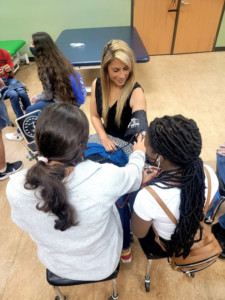Can ‘embracing geekness’ help improve schools?
A reporter asked me this today. The question of motivating American kids is an interesting and important one with limited associated research. A dissertation on this subject might be titled, “Removal of Psycho/Social Developmental Barriers of High Achievement” (that was actually a section in a charter application I just read). More broadly, it’s the nascent subject of motivational sciences—how to get kids to do the hard work necessary to achieve at high levels?
Asian cultures seem to have a stronger, or at least more universal cultural press for academic success. In China it’s related to the human funnel created by the college entrance exam—if you’re not in the 10% that pass, you’re basically screwed for life.
In urban American schools I’ve seen three attempts to connect students to their inner geek.
1. Small schools with an academic mission. As Ted Sizer and Debbie Meier taught many of us, small schools give the adults have an opportunity create an intentional academic culture. Most big secondary schools have a student created culture with all of the cliques that have formed the basis for countless movies and musicals.
2. Motivational schemes. Small academic schools are using a number of strategies work for finding the ‘hook’ that will encourage kids to do difficult work:
· Application: the projects at High Tech High are so cool that visitors are often drawn into creation or demonstration.
· Thematic application: hundreds of new high schools focus on particular themes, some occupational (STEM, health, art, etc) or activist (green, social justice, etc).
· College press: all good schools do this, but for some the goal is a daily academic, visual, and engagement focus
· Activity: like application, some schools focus on active learning. Visit a KIPP school and you’ll hear students learning
· Recognition: some schools use recognition strategies as well as academic competitions
· Compensation: Roland Fryer’s pay-for-academic-performance and similar AP Strategies pilots indicate that some kids respond well to financial rewards. Learning games will become prevalent in the next few years and recognition and competition will be important elements.
3. Real world connections. Internships and service learning are often important components of most successful academic high schools. To butcher a Debbie Meier quote, “young people need the opportunity to hang with adults they can imagine themselves becoming.” The Big Picture network of 60 schools is focused on finding something that kids are interested in and then creating valuable ‘Learning Through Internship’ experiences; everything else is backfill.
The point is, given the importance of high and equitable achievement and weak or inconsistent academic press, the nascent subject of motivational sciences will grow in importance. We need to get smarter about finding and exploiting the hook.






Kelsey Parker
While I completely agree that schools and school reform need to incorporate more research into motivational sciences, I also wonder whether there isn't enough pressure placed on parents to provide that 'hook.'
As Obama told a joint session of Congress a couple months ago, "There is no program or policy that can substitute for a mother or father who will attend those parent-teacher conferences or help with the homework or turn off the TV, put away the video games, read to their child. Responsibility for our children's education must begin at home."
Replies
Tom Vander Ark
No question, home-based motivation is top of list in terms of student success. Haven't seen many good examples of doing this at scale but working with EdEquality.org and ParentRevolution.org which are making attempts to rally parent support for reform as well as encouraging parents to hold high expectations for their kids. I'm also involved in starting a charter school in Bed-Stuy where Bethany Baptist plays an important role in maintaining high expectations for neighborhood kids. As a superintendent, I found faith congregations to be key in this regard.